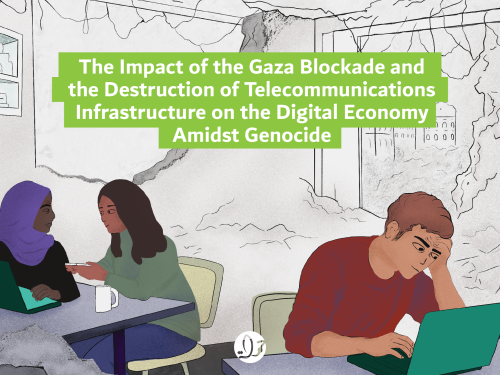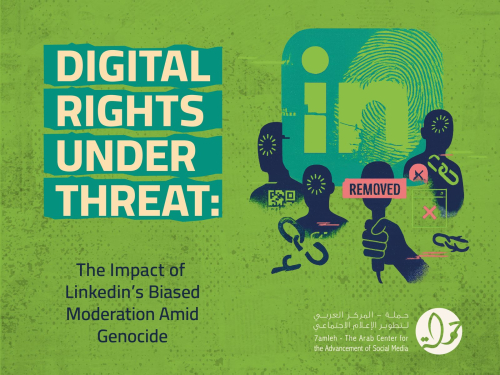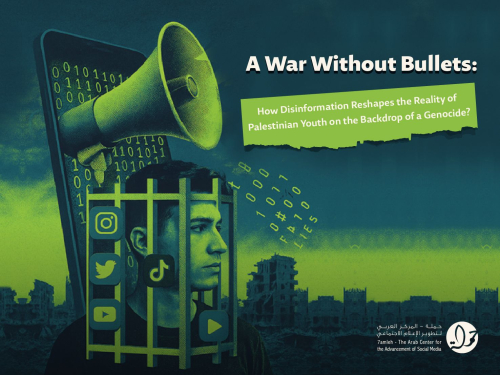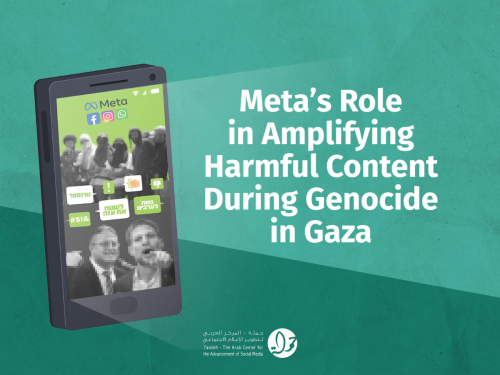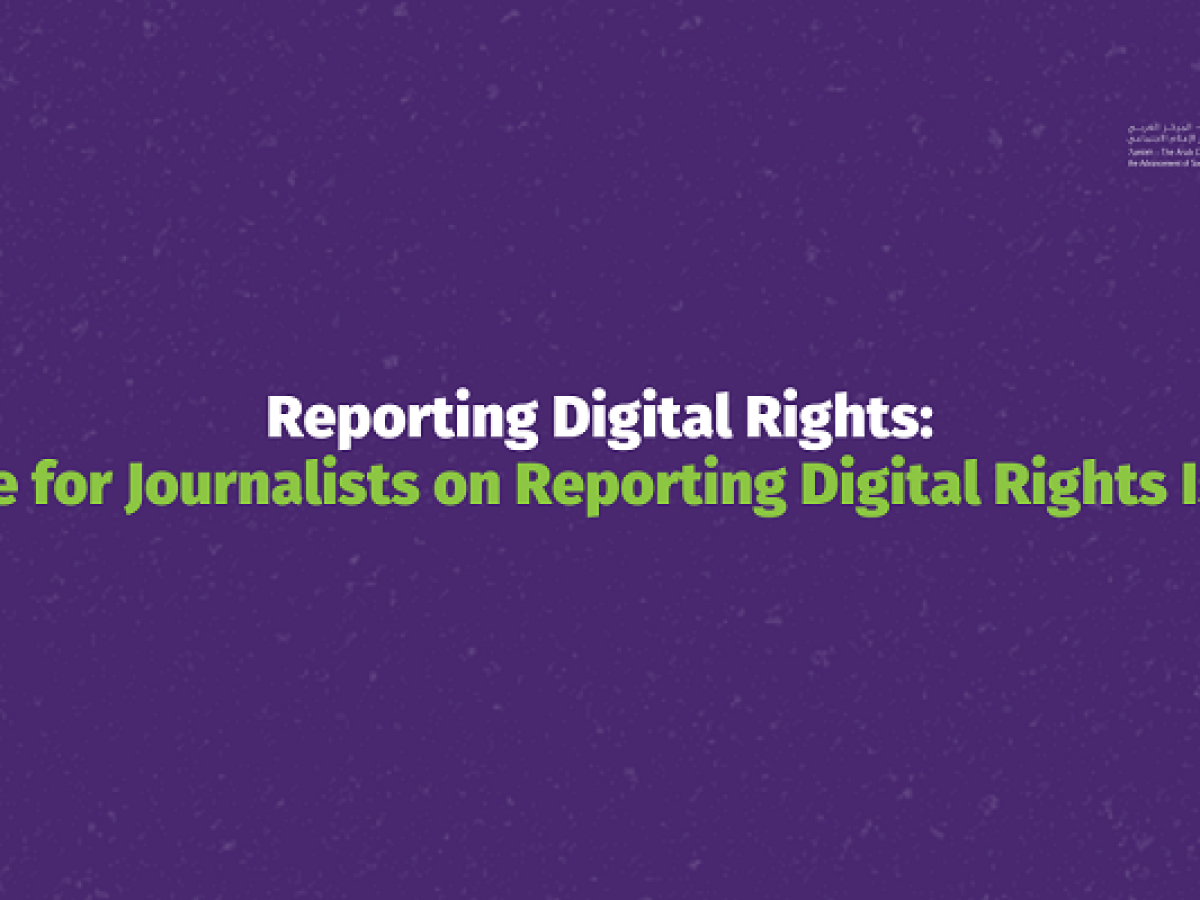
Throughout 2020, 7amleh - The Arab Center for the Advancement of Social Media, closely monitored local and international news reporting on digital rights issues and violations in Palestine. This helped the 7amleh team identify patterns, trends and inclinations in existing reporting in this field, and develop a nuanced understanding of the strengths and weaknesses of journalists, as well as the opportunities and limitations that shape and govern reporting on issues relating to digital rights, in Palestine and worldwide.
In its fifth annual Palestine Digital Activism Forum (PDAF), 7amleh also hosted a workshop with Dr. Philip De Salvo, who has substantial experience in reporting on digital rights, and has done extensive research on the best practices for journalists working in the field. During the workshop, De Salvo shared with 7amleh and the participants in its forum, a wide array of digital tools, as well as online and offline resources to aid journalists in their work to cover digital rights issues.
In this guide, we aim to share the key lessons we learned in our close monitoring of news reporting on Palestinian digital rights, and from our partners and allies who work on similar issues in a variety of different contexts. In doing so, we intend to activate the knowledge we have accumulated over the past year, by sharing it with active agents on the ground in the form of simple and accessible tips, that ultimately aim to contribute to a better, more equitable and more ethical news reporting, that is capable of influencing societies and bringing about positive change on the ground.
Understand the Importance of Your Role
The role of journalists who report digital rights violations and relevant issues is essentially two-fold. Journalists are, firstly, a crucial force in bringing clarity to a world severely lacking in transparency and accountability; as we live in a reality where the very technology that shapes, defines and fuels the digital world, is provided and governed by the companies and authorities that are the very perpetrators that violate the digital rights of its users. In other words, wherever technological companies lack transparency, wherever internet providers refuse to make information accessible, and wherever authorities abuse their power in ways that violate users’ rights, journalists are directly responsible for making information accessible, raising awareness, documenting and highlighting violations and abuse. Journalists are also crucial in stirring public concern, generating momentum, and creating enough pressure to compel decision makers to revise and ultimately reform existing structures and policies that violate users’ digital rights. Reckoning with the importance of this role should be at the foundation of any journalistic work we do, specifically in the field of digital rights.
Join Forces and Diversify Resources
Given the centralization of the information and power that govern the digital world in the hands of technology companies and governments, we at 7amleh have come to learn that cooperation is key for journalists to be able to gather information and successfully and safely share it with the public. Specifically, we advise that journalists communicate and work with researchers, research institutes, grassroots activists and organizations, and international organizations that can provide additional sources of information, as well as protection, support, and advice, that would help journalists deliver more ground-breaking work, reach larger audiences, and ultimately make a larger impact.
For instance, this may be specifically useful in places where users are detained on alleged charges of “defamation,” “threatening national security,” or involvement in some form of “terrorism”, violating their right to freedom of expression online. Most of the time, journalists on their own struggle to identify these arrests and find out the true reasons behind them. This was evidenced in our media monitoring, as we found that only a minority of reports cited arrests as a form of violation of digital rights, while the majority cited more obvious methods, of a more immediate technological nature, such as surveillance technologies. This is where cooperation becomes necessary, as activists and civil society organizations tend to possess the experience in finding out this information.
In addition to researchers and activists, we recommend that journalists do not shy away from enlisting the work of whistleblowers, white hat hackers and technologists, in order to support their reporting. While whistleblowers and hackers can help journalists access information about technology corporations and governments that would have been difficult to access otherwise, technologists can be very helpful for journalists to better understand the field they are reporting on, and to access advanced tools that can assist in their reporting and expand their reach. We must note, however, that journalists should be careful when working with such sources, as legal consequences may apply, specifically when working with hackers.
Think Local & Start with Your own Story
Given the universality of the violence we face in the digital world, to achieve greater impact, t it seems necessary to always speak of atrocities and violations on a global level. However, we at 7amleh have come to learn that local stories make a larger impact, even globally; is because when we focus on stories closer to us, we are able to notice details and nuances which helps us discover more information. This allows us to reveal more about the ever evolving forms of violence we experience in the digital world. As a result, sometimes a powerful and moving local story is able to reach a larger audience, more deeply influence people, and thus create a larger impact across borders and barriers.
Pay Attention to the Unspoken & the Unheard
While it is important for journalists to pay attention to trending topics during specific periods of time and certain contexts, it is also important to step back and address issues not being spoken about? And why? Which groups are not speaking out? Which topics are spoken about less? Does this always mean the absence of violence? In fact, more often than not, groups that speak out the least, are those facing the most violence. For instance, vulnerable groups in certain societies, such as those living in poverty, women, and members of the LGBTQ+ community, find it harder to speak about the violence they face online. This was evidenced in our Media Monitoring research, as we found that only 15% of reporting addresses issues of discrimination, while the majority focused on issues of censorship and surveillance. In other cases, oppressive regimes can limit the scope of news reporting that local journalists can conduct on specific issues, such as arrests and censorship. We found in our research that only 3.5% of reporting addresses cases where users were denied their rights to assembly and association, which often tends to be cases framed as “threats to national security.” In many of these cases, while most local journalists are unable to report on what is happening, others in safer locations and contexts may be able to do so. This is why we recommend that in order to achieve more equitable, responsible and impactful reporting, journalists must always pay attention to the unspoken, and the untold.
Do Not Jeopardize the Safety of Individuals
While journalists might need, in their investigations, to meet and speak with a variety of different people, to learn more about violations and deliver detailed and well-referenced reporting, it is crucial that the safety of these individuals is a number one priority. For instance, when requested to stay anonymous, or when the safety of the individual is in jeopardy, journalists should not reveal the personal information of their sources or subjects of reporting, as well as take care to not provide too many details that can lead authorities to their identities and place them at risk. The primary aim of ethical journalism is to achieve a better reality for societies, and jeopardizing people’s safety can never be of any service to that cause.
Related Articles
Subscribe to Our Email Alerts
And stay updated with our latest activities, news, and publications!

